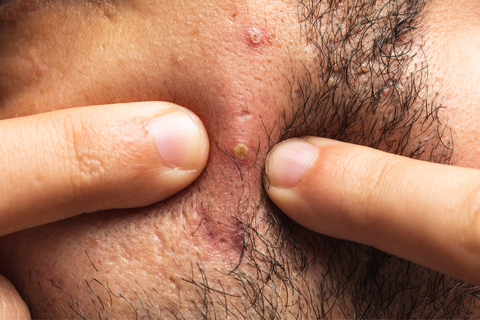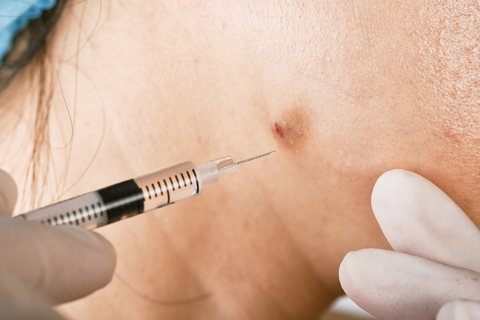WHAT ARE THE CAUSES AND TREATMENTS FOR EPIDERMOID CYSTS
What are Epidermoid Cysts
Epidermoid cysts are common and can sometimes be confused with an ingrown hair or razor bumps. An epidermoid cyst starts out small, as it gradually grows in size, you might wonder if you’re dealing with something serious. Epidermoid cysts most commonly occur in adults, particularly young-to-middle aged. They occur twice as frequently in men than in women and can appear anywhere on the skin. Typically harmless, the slow-growing bumps often show up around hair follicles on your face, groin area, trunk, upper back, or scalp. And they range in size from a half inch to a couple of inches across.
It’s easy to feel self-conscious, especially if the cyst appears somewhere obvious, like your face. While they aren’t cancerous, the lumps and bumps of epidermoid cysts can be stressful. And in some cases, ignoring one might lead to avoidable complications.

What are the Causes of Epidermoid Cysts
The surface of your skin (epidermis) is made up of a thin, protective layer of cells that your body continuously sheds. Most epidermoid cysts form when these cells move deeper into your skin and multiply rather than slough off. The epidermal cells form the walls of the cyst and then secrete the protein keratin into the interior. The keratin is the thick, yellow substance that sometimes drains from the cyst. This abnormal growth of cells may be due to a damaged hair follicle or oil gland in your skin.
How are Epidermoid Cysts Diagnosed
To diagnose epidermoid cysts, your healthcare provider will examine the bump and surrounding skin, as well as request your medical history. They’ll ask for details on how long the bump has been present and whether it has changed over time.
Healthcare providers can usually diagnose an epidermoid cyst by examination only, but sometimes an ultrasound or a referral to a dermatologist is needed to confirm the diagnosis.
What are Epidermoid Cyst Cure or Treatments
While there’s no known cure to prevent an epidermoid cyst from forming, you can take steps at home to lower your risk for related problems.
- Do not squeeze the cyst yourself - Squeezing out the contents of the cyst on your own can lead to inflammation and/or infection, so it’s best to leave the cyst alone.
- Place a warm, moist cloth over the area to relieve the pressure and help the cyst drain and heal. If the cyst does not drain on its own then don’t force it.
If the cyst doesn’t go away on its own or becomes red, swollen, or painful, changes in size or character then talk to your doctor or dermatologist about these options:

- Antibiotics to prevent or treat infection and reduce inflammation
- Injection treatment - involves injecting the cyst with steroid solution.
- Minor surgery - incision and drainage. Your doctor makes a small cut in the cyst and gently squeezes out the contents. Once a cyst is drained, it’s very possible that the cyst will grow back. If there’s any significant change in a cyst, it’s recommended that you see your healthcare provider.
In most cases, epidermoid cysts cause no long-term problems. On rare occasions if the problem persists it may be associated with genetic diseases that may have medical consequences. Something to keep in mind is that cysts can sometime leave a scar or hyperpigmentation, especial for higher melanin skin types.
Why Choose urth?
Although there is no known way of preventing epidermoid cysts, men's skin care products can help maintain a clear complexion. urth has curated skin care kits for men to simplify men's skincare routine. These plant powered men’s skin care products are formulated with chamomile, green tea, ginseng and pure essential oils to cleanse, brighten, nourish skin and protect against signs of aging. Improved and better skin after every use. Perfect for all skin types - including men with sensitive, dry, combo, and oily skin.
References: Amber Erickson Gabbey “Epidermoid Cysts” Healthline.com, February 2020 https://www.healthline.com/health/epidermoid-cysts#diagnosis

